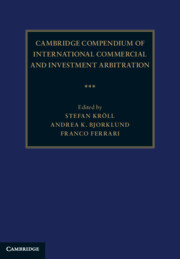Book contents
- Cambridge Compendium of International Commercial and Investment Arbitration
- Cambridge Compendium of International Commercial and Investment Arbitration
- Copyright page
- Contents
- Figures
- Tables
- Contributors
- Preface
- Part I Foundations
- Part II Public Law Questions Relating to Arbitration
- Part III Stakeholders in Arbitration
- Part IV Applicable Law
- Part V Jurisdiction of the Arbitrator
- 23 The Arbitration Agreement: Legal Nature, the Contractual and the Jurisdictional Aspect
- 24 The Various Forms of ‘Consent’ in International Arbitration
- 25 Protecting and Challenging the Arbitrator’s Jurisdiction
- 26 The Competence-Competence Principle’s Positive Effect
- 27 The Competence-Competence Principle’s Negative Effect
- 28 The ‘Separability’ of the Agreement to Arbitrate
- 29 Admissibility versus Jurisdiction
- 30 Settlement Efforts and Contract Adaptation by Arbitral Tribunals
- Part VI The Arbitral Tribunal
- Part VII Procedural Questions in Arbitration
- Part VIII Role of State Courts in Arbitration
- Part IX Awards
- Part X Post-Award Issues
- Part XI Legal Concepts
- Part XII Areas of Concern
- Part XIII Arbitration and Related Fields
- Part XIV EU Law and Arbitration
23 - The Arbitration Agreement: Legal Nature, the Contractual and the Jurisdictional Aspect
from Part V - Jurisdiction of the Arbitrator
Published online by Cambridge University Press: 18 February 2023
- Cambridge Compendium of International Commercial and Investment Arbitration
- Cambridge Compendium of International Commercial and Investment Arbitration
- Copyright page
- Contents
- Figures
- Tables
- Contributors
- Preface
- Part I Foundations
- Part II Public Law Questions Relating to Arbitration
- Part III Stakeholders in Arbitration
- Part IV Applicable Law
- Part V Jurisdiction of the Arbitrator
- 23 The Arbitration Agreement: Legal Nature, the Contractual and the Jurisdictional Aspect
- 24 The Various Forms of ‘Consent’ in International Arbitration
- 25 Protecting and Challenging the Arbitrator’s Jurisdiction
- 26 The Competence-Competence Principle’s Positive Effect
- 27 The Competence-Competence Principle’s Negative Effect
- 28 The ‘Separability’ of the Agreement to Arbitrate
- 29 Admissibility versus Jurisdiction
- 30 Settlement Efforts and Contract Adaptation by Arbitral Tribunals
- Part VI The Arbitral Tribunal
- Part VII Procedural Questions in Arbitration
- Part VIII Role of State Courts in Arbitration
- Part IX Awards
- Part X Post-Award Issues
- Part XI Legal Concepts
- Part XII Areas of Concern
- Part XIII Arbitration and Related Fields
- Part XIV EU Law and Arbitration
Summary
An arbitration agreement expresses the consent of the parties to a legal relationship to submit the settlement of their disputes to an arbitral tribunal. As such, it is a unique type of contractual arrangement. While it has a contractual origin, it also confers the arbitral tribunal a jurisdictional power to settle legal disputes which would otherwise be submitted to State courts, hence bearing jurisdictional effects. This dual nature is further demonstrated by the variety of rules governing arbitration agreements, mainly contracts and procedural law, to such extent that it is a commonplace to assert nowadays that arbitration is dual or sui generis. These two aspects further need to be assessed by taking into account the unique legal framework enacted over the years to safeguard or limit the legal effects of arbitration agreements. This Chapter further dives into the sui generis nature of arbitration agreements and the dialectical tension between the contractual and jurisdictional aspects of arbitration as a dispute settlement mechanism. While the validity and applicability of arbitration agreements, mostly inspired by contracts law and the principle of party autonomy, determine the arbitrators’ jurisdiction, the legal mechanisms triggered by arbitration agreements are mainly focused on safeguarding the arbitral tribunal’s jurisdiction.
Keywords
- Type
- Chapter
- Information
- Publisher: Cambridge University PressPrint publication year: 2023

